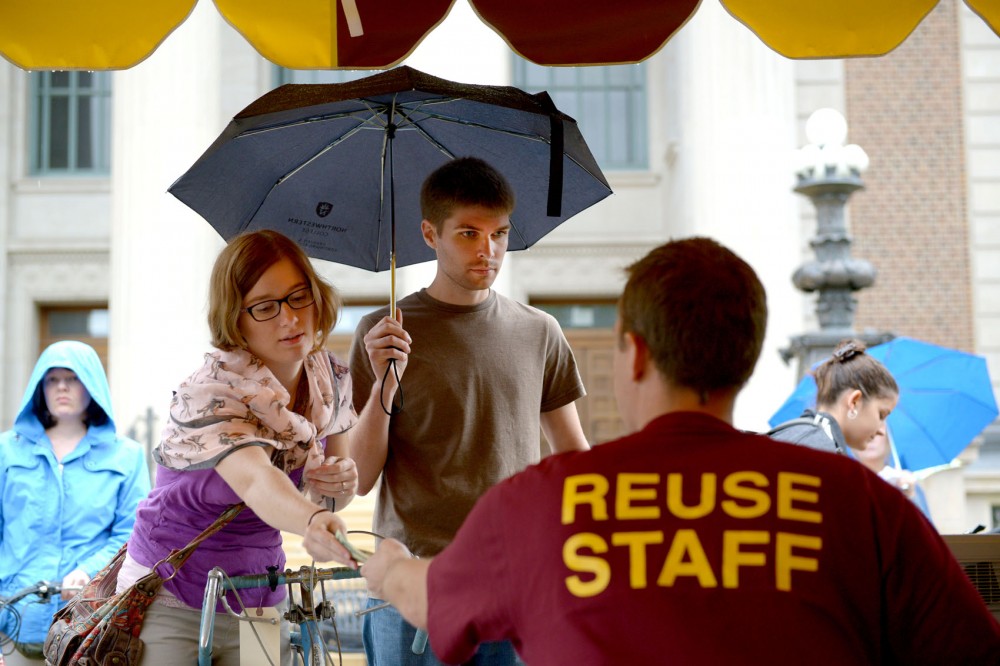As University of Minnesota students rushed along a rainy Northrop Mall to their morning classes this Wednesday, a raincoat-clad line of more than 100 of their classmates stood resilient.
Winding down from Northrop Plaza and angling as far as Tate Laboratory of Physics, the line was full of students waiting to get their hands on used bikes, furniture, dorm supplies and artwork.
This fall marks the University of Minnesota ReUse Program’s third ReUse-A-Palooza event, an effort to make the University community aware of the many alternatives to buying new.
Sophomore Nathan Weber arrived at Northop Plaza at 9:30 a.m., an hour and a half before the sale started, to secure the first spot in line.
He admitted that the opportunity to reuse was not the main attraction for him.
“Cost is definitely a driving factor here,” Weber said. “Seeing as the discounts they’re having here is anywhere from $10 to $50 … I have no problem with buying a used bike.”
Almost all of the bikes were gone within a half hour.
The ReUse Program started in 1993 as a small recycling initiative based in Minneapolis, said Stacey White, the ReUse Program manager. Over time, the group began selling gently used items to University faculty and staff members.
As word spread, the program began catering to students as well as the general public. It soon had its own warehouse in the Southeast Como neighborhood, where it continues to sell reusable items every Thursday.
The only problem with this facility, White said, is it’s far from the heart of campus.
“We just don’t get the traffic that we’d really like to see,” White said.
Since its debut at Beautiful U Day 2011, ReUse-A-Palooza has been the ReUse Program’s way to reach out to the University community from a centralized location.
Although the program advertised little for the event, the sale attracted many students by word of mouth. By the time the yellow tape of the bike sale was lifted at 11 a.m., more than 100 students had lined up in the plaza.
To avoid congestion and chaos, students were released into the bike area in groups of 10 to 15. This new technique along with clearly-marked lines and boundaries set up this year prevented a recurrence of last year’s scramble for bikes, White said.
In the past, the ReUse Program has partnered with Re-Cycle Bike Shop at bike sale events. As the face of the year-old U of M Bike Center, the Hub Bike Co-op stepped in to look over the used bikes.
Between checking tire alignment and repositioning the forks on students’ bikes, Hub Coordinator Ben Fulmer-Erickson told students about necessary investments they should make. He predicted the relative costs of new chains or brake tune-ups.
The Hub Bike Co-op worked with the ReUse Program in the past by gathering and repairing bikes for resale, Fulmer-Erickson said. This event was an opportunity for the organizations to strengthen their partnership while informing the campus community about reuse options.
“A lot of places do ‘either or,’ like used or new. We kind of do a lot of both,” Fulmer-Erickson said. “So I think that having that comprehensive perspective … is helpful to them, and they are helpful to us in providing these sorts of opportunities.”
In addition to the Hub’s basic checks at the event, the center offered students a discounted tune-up at its Oak Street location.
Biomedical engineering sophomore Lyndsay Gusek works as a community advisor in Middlebrook Hall, where many bikes have recently been stolen.
She said she came to the event to find an affordable bike that she felt comfortable leaving outside throughout the year.
After arriving an hour early for the chance to scope out as many bikes as possible, Gusek said the turnout made waiting for the event more enjoyable.
“Even waiting out in the rain here, everyone’s anticipating getting in here to buy the bikes,” Gusek said. “Being here just trying to get a good deal is fun. I can also get a good bike, but that’s almost secondary.”


